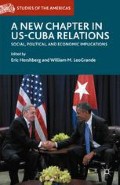Abstract
Like Americans, Cubans—on the island and in the diaspora—have laid claim to exceptionalism. Although American exceptional-ism may be self-evident, Cuba’s is not, at least to the outside world. Geographic location, the preeminence of Havana in colonial times, the cane-based economy when sugar meant wealth, the interest of European countries, and the special relationship with great powers like Spain and the United States engendered an uncommon national sense of self in Cuba. When Spain lost her prized colony, “more was lost in Cuba” took hold in the popular imagination of Spaniards as the response to any tale of woe. In 1959–1960, the Eisenhower administration seemed to be at a loss when trying to explain what had happened on the island. Like Spain, the United States had perceived the island to be “ever-faithful.”
Access this chapter
Tax calculation will be finalised at checkout
Purchases are for personal use only
Preview
Unable to display preview. Download preview PDF.
References
Asamblea Nacional del Poder Popular. 2014. “Texto de la Ley No. 118 de la Inversión Extranjera.” Granma, April 16. http://www.granma.cu/cuba/2014-04-16/asamblea-nacional-del-poder-popular.
Bendixen and Amandi International. 2015. Special Session: Polling Results on Cuban Americans’ Viewpoint on the Cuba Opportunity. https://www.american.edu/clals/upload/Bendixen-Amandi-Poll-Cuban-Americans-Viewpoint-2015–03.pdf.
Caputo, Marc, and Joey Flechas. 2014. “Poll: Cuban-Americans Split on Obama’s Cuba Policy.” Miami Herald, December 19.
Castro Ruz, Fidel. 1991. “Discurso pronunciado por el Comandante en Jefe Fidel Castro Ruz, Primer Secretario del Comité Central del Partido Comunista de Cuba y Presidente de los Consejos de Estado y de Ministros, en la inauguración del IV Congreso del Partido Comunista de Cuba.” Speech given at the Teatro “Heredia,” Santiago de Cuba, October 10. http://www.cuba.cu/gobierno/discursos/1991/esp/f101091e.html.
Domínguez, Jorge I. 1989. To Make the World Safe for Revolution. Cambridge: Harvard University.
Florida International University Cuban Research Institute. 2014. “2014 FIU Cuba Poll: How Cuban Americans in Miami View U.S. Policies toward Cuba.” https://cri.fiu.edu/research/cuba-poll/.
Fuentes, Norberto. 1970. Cazabandido. Montevideo: Libros de la Pupila.
Gámez Torres, Nora. 2015. “Sources: Google Offered Cuba Expansion of Web Access.” The Miami Herald, July 2. http://www.miamiherald.com/news/nation-world/world/americas/cuba/article26186836.html.
Kiger, Patrick J. 1997. The United States, Cuba and the Helms-Burton Act. Washington, DC: Washington Center for Public Integrity.
LeoGrande, William M., and Peter Kornbluh. 2014. Back Channel to Cuba: The Hidden History of Negotiations between Washington and Havana. Chapel Hill: University of North Carolina.
Pérez-Stable, Marifeli. 2011. The United States and Cuba: Intimate Enemies. New York: Routledge.
—. 2012. The Cuban Revolution: Origins, Course, and Legacy, 3rd edn. New York: Oxford University.
Secretariado General de los Obispos Católicos de Cuba. 1995. La voz de la Iglesia en Cuba: 100 documentos episcopales. México, DF: Obra Nacional de la Buena Prensa.
United Nations Office of the High Commissioner for Human Rights. 1966. “International Covenant on Civil and Political Rights.” Adopted and opened for signature, ratification, and accession by General Assembly resolution 2200 (XXI) of December 16 and entered into force on March 23, 1976. http://www.ohchr.org/en/professionalinterest/pages/ccpr.aspx.
Valdés-Fauli, Raúl J. 2014. “What the New Foreign Investment Law Means.” Law360, August 11. http://www.foxrothschild.com/raul-j-valdes-fauli/publications/what-the-new-cuban-foreign-investment-law-means/.
Editor information
Editors and Affiliations
Rights and permissions
Copyright information
© 2016 The Editor(s)
About this chapter
Cite this chapter
Pérez-Stable, M. (2016). Cuban Exceptionalism. In: Hershberg, E., LeoGrande, W.M. (eds) A New Chapter in US-Cuba Relations. Studies of the Americas. Palgrave Macmillan, Cham. https://doi.org/10.1007/978-3-319-29595-4_8
Download citation
DOI: https://doi.org/10.1007/978-3-319-29595-4_8
Publisher Name: Palgrave Macmillan, Cham
Print ISBN: 978-3-319-31151-7
Online ISBN: 978-3-319-29595-4
eBook Packages: Political Science and International StudiesPolitical Science and International Studies (R0)

